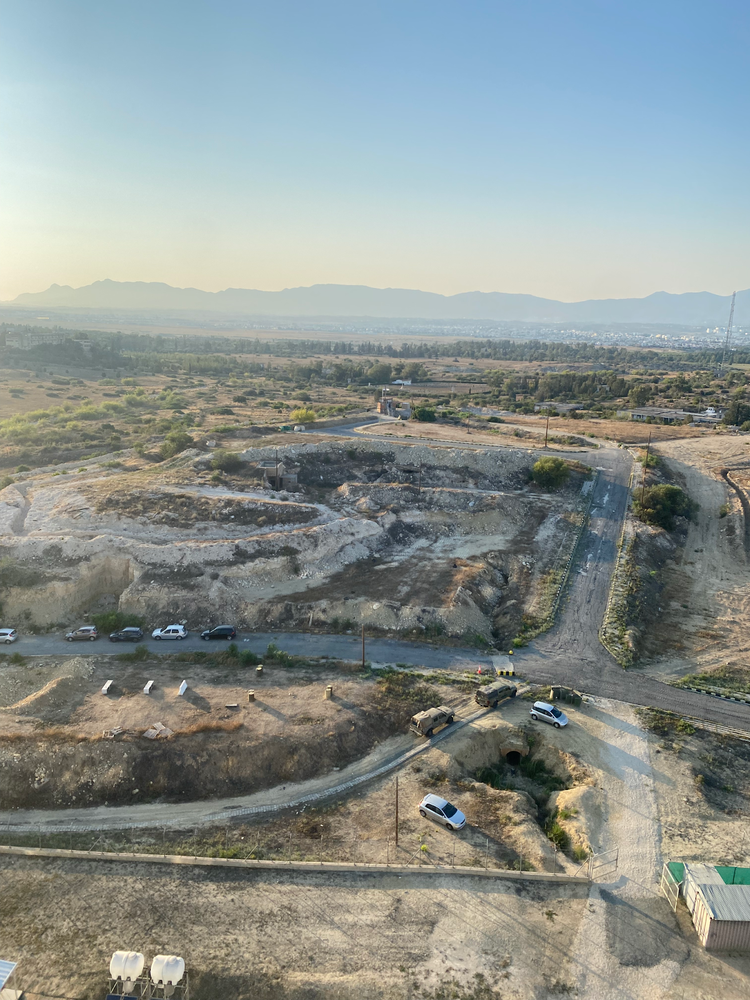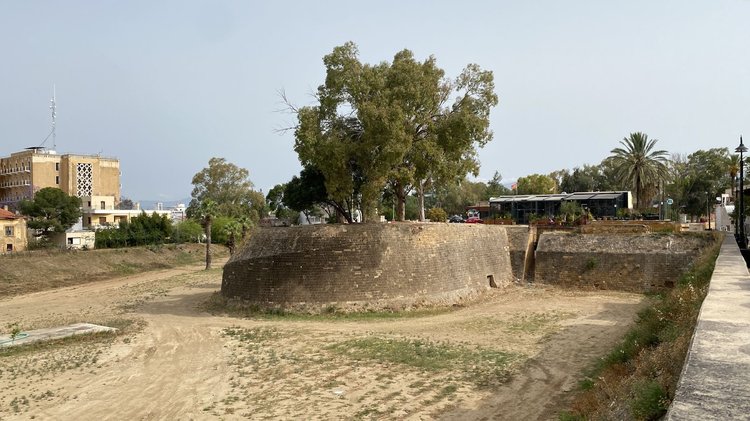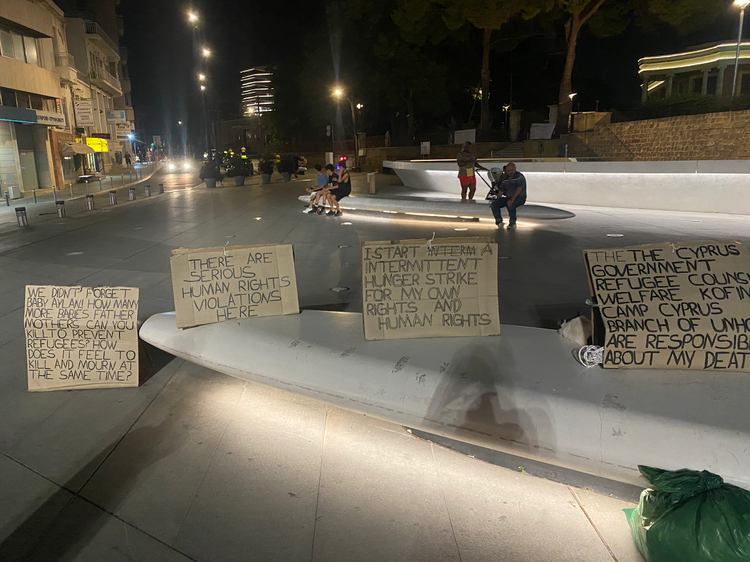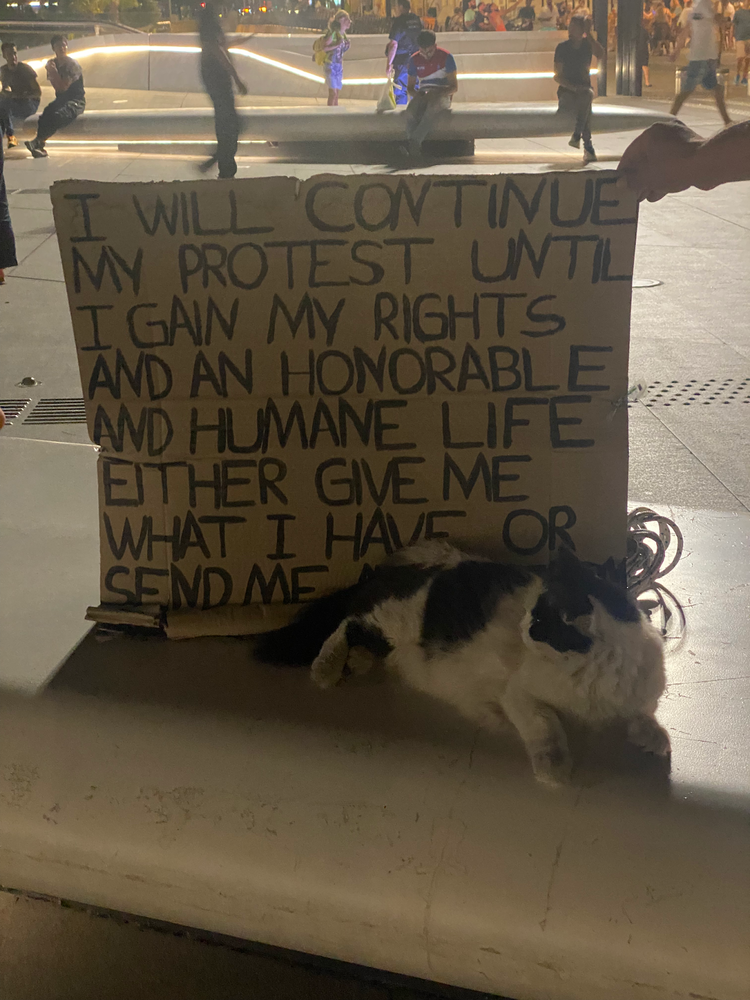Pushbacks in Cyprus: Stuck in Limbo
October 13th, 2024 - written by: Border Violence Monitoring Network
Introducing Cyprus' buffer zone
Since 1974, the island of Cyprus has been de facto divided into two areas, separated by a UN-controlled demilitarized “Buffer Zone”. The area north of the “Buffer Zone” which we will refer to as North Cyprus is administered by the self-proclaimed Turkish Republic of Northern Cyprus, whilst the area south of the “Buffer Zone” is administered by the Republic of Cyprus. The “Buffer Zone” is not considered a border by the Republic of Cyprus or the international community, as the Turkish Republic of Cyprus is not a recognised state and the Republic of Cyprus’ territory spans the whole island, with the exception of the two British bases.
In recent years we have seen the “Buffer Zone” and its matters of territorial disputes weaponized by the Republic of Cyprus as a space of legal limbo, pushing back or trapping people on the move in the area, violating their right to asylum.
These pusbacks have been reported since 2020.[1] However, since mid-May 2024, pushbacks have been turned into a systematic practice, with the Republic of Cyprus trapping and pushing people back in several locations in the” Buffer Zone”, some being forcibly returned even after they had submitted an asylum claim at the First Reception Center. The number of people trapped continuously rises: in August 2024 70 people were reported to be there.[2]
In the Border Violence Monitoring Networks Monthly Report for June you can find more information on the people stuck in the “Buffer Zone”.

In a previous pushback in December 2022, two Kurdish men were trapped at the Ledra Palace official crossing point of the “Buffer Zone” in Cyprus’ capital city Nicosia. One of the two men, Ferit, remained stranded in the” Buffer Zone” for 9 months, until September 2023, when he was finally allowed to enter the Republic of Cyprus and apply for asylum.[3] Since then he has been protesting at Nicosia’s central Eleftheria square. We interviewed him to share his experiences and demands for justice.
Interview with Ferit
I thought we could maybe start with you just saying a little bit about who you are, just introducing yourself in words you feel comfortable with.
My name is Ferit, I was born in Diyarbakır, in the southeast part of Turkey. I'm a Kurdish citizen. At one point in my life, when I was doing my own thing, because of some bad things that happened to me, they threw me in prison. Even though I was in the right, and they treated me in an unrightful way, I accepted it... and I obeyed them… But, in jail, the guards, the police officers, they kept hitting me. They didn't just shoot me, even though there were people who were killed inside. There were people who were tortured. Because of the problems they put us in, we were punished. After that, I was given a chance. I was released because of the pandemic. After that, I had the chance to flee. I fled to Northern Iraq, to the Kurdistan Region. In the Kurdistan Region, I also had bad experiences. After those bad experiences, as a result, I left to where I could feel safe. I don't have a family anymore and this journey will not end until I will feel safe. Not only in Turkey, but in other parts of the world, it is obvious what is happening to the Kurdish community.
I want to ask about when you last year were stuck in the buffer zone from December 2022 to September 2023, like the people who are stuck now. Could you explain a little bit more about how this happened and how you experienced this?
Before I came here I had never been to Cyprus, so I didn't know what the border (Buffer Zone) was and how to get there. So I went in search of a guide and we found a friend who was going to help. I came here, he guided me, he showed me the way. I jumped (down the wall into the buffer zone), after I jumped he jumped too. After that, we went to the police to apply for asylum in accordance with the procedures. When they saw us they pushed us back. There was a fight, they tried a lot to push us back. But we couldn’t go back (to North Cyprus). At least I couldn't go. After that, they looked at us and saw that we couldn't go. They said, okay, wait. We waited until the morning. We waited in front of the door. It was very cold. Then in the morning, the United Nations police and soldiers and the Cypriot police came. They were talking among themselves. At that moment, I only knew hello and how are you (in English). They didn't accept us and pushed us back. I said, if you give me to them (personnel working for the administration in North Cyprus), I will die. Thank God, there was a Czech police officer there, from the police of the United Nations. There was an Irish lady there too, she was also a police officer from the UN. A translator came. We talked to the translator. They said, don't be afraid. Don't panic. They said they pushed you back, but we don't have the authority to push you back (further to North Cyprus). We will not do such a thing. You are free to stay (in the Buffer Zone), but as long as you want to stay, we can give you a tent here.
We can help you eat. You can go wherever you want, but as long as you stay here, we will try to implement the procedure. We will inform the relevant authorities so that they can find a solution. Otherwise, we will not intervene.
I stayed there for a week. A week later, the friend of mine ran away overnight. He went back. I stayed, I had to stay, I wish I could have gone back too. He went to the north.
There was no solution. I stayed there for 9 months.
I had bad days, I had stressful days. If we look at the source of all these problems, they are all problems created by the South Cyprus government. These are the problems that have forced me to stay there. If they had acted according to the procedure when we came to the door, we wouldn’t have stayed there. I was attacked by people from the North. They threw sandals and stones at me. I was threatened by the police many times. One night I heard a gunshot. I heard it, told UN forces and they looked. They couldn't find a bullet. I couldn't even sleep that night. They threatened me all the time. It was a risk every day.
The good and the bad, you don't have enough time to think about the details, because they are all recorded for me to remember. I have accumulated a lot of good and bad moments.
After the nine-month process, they took me in. I said, everything is over now, I will start my life again.

You eventually managed to apply for asylum. Can you explain what happened after you left the Buffer Zone?
I faced problems, also in the camp. Normally, people would stay in the camp for two weeks. They kept me in the camp for two months. And every time, they tried to make me angry with psychological pressure. Every time. So far, I have overcome this thing millions of times.
I was kept in the camp for two months. At the end of the two months, they sent me to the Kofinou camp, but there they threw me out. I had no status, no work permit, no money, no home, no place to stay. And I was left to my fate. After that, I went to the so-called aid organizations. I wandered, I wandered. Either give me a document, let me work, or be a helper. Help me until I get that document. They all pushed me to insolvency. I went to all of them a few times. For example, I went to the police station five times. I told them on my last visit, if no one helps me, I have no choice but to protest. No one helped. So I came here to start the protest.
As I said, if we try to detail all that happened, all the bad things we experienced, if we try to detail all of them, it takes days. That's why we're going through it head on. We're trying to answer many questions.
Could you tell us a little bit more about the protest you are doing now? How did it start? What exactly did you write on the signs? And why did you write on the signs the things that you did?
My protest started from day one, the day that I had to stay there. And after 8 months I started a hunger strike.
What I wrote on the signs... I tried to draw attention to as many things as I could, I tried to raise awareness to certain topics, I cannot spread awareness about every topic, but I try in my own way. I wanted to raise awareness about simple human rights violations. I was moved by a baby who was killed (Aylan Kurdi) and I wrote that... because of these human rights violations, those people are dying. I'm trying to explain this. There are lots of things to write, but they are not letting me write and put many signs. This is capitalism, they don't want you to write what you think, they want you to write what they want you to think. Because I didn't have any problems, I raised my one hand to capitalism, but my other hand is still a fist.
I don't know what to say, if I go to the other side, there is no life, but I am not safe here either. At night, there are 20 or 25 people who come here to threaten me.


Last time we spoke, you also talked a lot about justice. That you are always hungry for justice and you want to be once filled and satisfied.
You are right. But maybe that hunger affected me in a way that... I can understand that in Turkey Kurdish people are not liked officially. And they are facing discrimination. But it's important to separate yourself from that fascist view and just do your job.
But power... that wheel has the power, so it affects like it's a domino effect. We are all people of course. And it's all our life to live. What can be more normal to desire or to want than this right to live?
For example, I don't interfere in anyone's life as long as I follow the rules and laws. As long as I don't interfere in anyone's life, I want to be seen and treated and live as a human.
And that's all. And when I talk about status, I'm not talking about being a businessman or mayor or president, but I just want to be treated as human. That's the status that I want. So, the thing called residency should be something that is given in a moment when you come here. But I want to get that status and I want to work legally and pay my taxes and have a home. And when I want to, I want to open my own shop.
So, that's the demand of this protest. And it's also towards the people, not just the system, but towards the people who were an obstacle through my ways. Either to find those people who didn't do their job properly or just give me the status and let me go to court.
To be honest, sometimes I feel like I'm being used as a lab rat, you know. To give an example to other refugees not to come here. Like even Meloni (Italian prime minister) said, and the world thinks this is how to solve the refugee situation, but this is not the way to solve the refugee problem. The solution is apparent, actually. The solution is to ask the question why the refugees are running away. It's all within the source, so everyone can find the solution, actually. Of course, there are exceptions, because there are people who are really in a bad shape, who are really threatened by the oppressive system. And in that case, every country is able to take them. And even politicians should be honest about some stuff. Let's give Germany, UK, USA or Switzerland as an example. These countries are always in need of external work power. And even in Turkey, it's like this. So, refugees shouldn't be something that they need to hate because they actually are contributing to the country's economy, population and the workforce.
Is there anything else you would like to say?
I already talked too much. And I will continue talking too much. It's been almost one year and eight months that they didn't provide me with any rights. And all my rights were violated, in the name of status, in the name of money. And I didn't have the opportunity to reflect on my situation, the unlawful treatment, this is an ongoing process. In the short term, I hope the ones who have been contributing to this negative situation will someday face the consequences for these unlawful treatments in the court and I want to document my wishes with this statement. Until the day we face in court, under the law, I am saying these things in order to be documented. The day will come that those people will be judged under the court.
Footnotes
-
Drousiotou and Mathioudakis
↩ -
Κουρούσιη, Νικολέττα. ‘Mεταναστευτικό: Eνισχύεται η επιτήρηση στη Νεκρή Ζώνη – Αυτοψία Yφυπουργού στην Αυλώνα’. Philenews, 8 August 2024. https://www.philenews.com/politiki/article/1497972/enischiete-i-epitirisi-sti-nekri-zoni-aftopsia-ifipourgou-metanastefsis-stin-avlona/.
↩ -
Corina Drousiotou and Manos Mathioudakis, ‘Cyprus AIDA Report 2023 Update May 2024’, Country Report, AIDA (ECRE, May 2024), 26, https://asylumineurope.org/wp-content/uploads/2024/05/AIDA-CY_2023-Update.pdf
↩